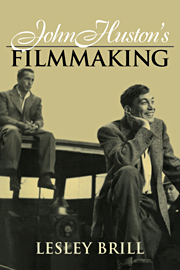Book contents
- Frontmatter
- Contents
- List of Illustrations
- Preface and Acknowledgments
- John Huston's Filmmaking
- Introduction
- Section I “What We Are Alone Is Not Enough”
- Section II “Are They Ready to Go Home?”
- Section III “Trying to Account for Themselves”
- Section IV The Heart of the Problem
- Section V Huston's Adieux
- Filmography: Films Directed by John Huston
- Notes
- Selected Bibliography of Writings on John Huston
- Index
Introduction
Published online by Cambridge University Press: 08 January 2010
- Frontmatter
- Contents
- List of Illustrations
- Preface and Acknowledgments
- John Huston's Filmmaking
- Introduction
- Section I “What We Are Alone Is Not Enough”
- Section II “Are They Ready to Go Home?”
- Section III “Trying to Account for Themselves”
- Section IV The Heart of the Problem
- Section V Huston's Adieux
- Filmography: Films Directed by John Huston
- Notes
- Selected Bibliography of Writings on John Huston
- Index
Summary
I'll be happy to be called what I am and for who I am – nobody's man.
John HustonA bad job for cinema auteurists, John Huston. A chameleon, taking on the coloration of whatever subject he decided to film, usually someone's novel about some man's screw-up. Nothing more consistent or characteristic, no personal theme beyond masculine failure, no recognizable visual style. A director without direction. Huston himself agreeing with his commentators: no “special message to convey,” no aesthetic or philosophic obsessions.
Just enormous talent and secure judgment for telling a lively story, for keeping those high-strung racehorses, movie stars, running the course, for making hits and coming back from duds with more hits. An artistic administrator, steering film companies through the chaos of cinematic production, using whatever it takes – literary talent, personal charm, empathy with horses and other beasts, being mysterious, being male, being lucky.
In sum, the best and least lovable qualities of the American movie industry personified. A corporation in himself of discipline and connections and technical smarts. After hours a pop-press feast of marriages and divorces, seas of alcohol, fist fights, practical jokes, name-brand friends, outspoken social views. And in the neighborhood theaters something easy to sell, something well tailored, sharply pressed, with cleanly turned seams, but maybe as generic and devoid of individuality as most of the Hollywood ready-made wardrobe. Spiritless stuff shaped not by writers, producers, directors, or cinematographers so much as by the publicity departments and stars of gargantuan companies: Warner Bros., MGM, Universal, Columbia, Twentieth Century Fox.
- Type
- Chapter
- Information
- John Huston's Filmmaking , pp. 1 - 14Publisher: Cambridge University PressPrint publication year: 1997
- 1
- Cited by

